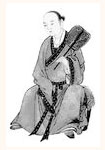“非不豪似周瑜”的意思及全詩出處和翻譯賞析
“非不豪似周瑜”全詩
樓櫓橫波征雁遠,誰見魚龍夜舞。
鸚鵡洲云,鳳凰池月,付與沙頭鷺。
功名何處,年年惟見春絮。
非不豪似周瑜,壯如黃祖,亦隨秋風度。
野草閑花無限數,渺在西山南浦。
黃鶴樓人,赤烏年事,江漢亭前路。
浮萍無據,水天幾度朝暮。
作者簡介(葛長庚)

白玉蟾(公元1194 - ?;現學界對其卒年尚有多種說法;)本姓葛,名長庚。為白氏繼子,故又名白玉蟾。字如晦、紫清、白叟,號海瓊子、海南翁、武夷散人、神霄散吏。南宋時人,祖籍福建閩清,生于瓊州(今海南瓊山)人,一說福建閩清人。幼聰慧,諳九經,能詩賦,長于書畫,曾舉童子科。及長,因“任俠殺人,亡命至武夷”。
《酹江月(武昌懷古)》葛長庚 翻譯、賞析和詩意
《酹江月(武昌懷古)》是宋代葛長庚創作的一首詩詞。以下是詩詞的中文譯文、詩意和賞析:
中文譯文:
漢江北瀉,流經長江和淮河,沖刷著歷史的沉積物。
樓船橫波,征雁飛過遙遠的水面,誰見過魚龍夜間翩舞。
鸚鵡洲上的云彩,鳳凰池中的月光,只能留給沙頭上的鷺鳥。
功名榮譽在哪里,每年只看到飛舞的春花。
并非沒有豪杰像周瑜一樣,英勇如黃祖,也隨著秋風消逝。
野草和休閑的花朵無數,遙遠在西山和南浦之間。
黃鶴樓的人們,赤烏的歲月,江漢亭前的道路。
浮萍無處棲身,水天幾度朝朝暮暮。
詩意:
這首詩詞以武昌為背景,通過描繪漢江的流淌、江上的景色和人物,表達了對逝去歲月的思念和對江南地域的感慨。詩中融入了歷史典故和自然景觀,展現了作者對歷史滄桑和人生離別的感嘆之情。
賞析:
這首詩詞以流水、船只、鳥雁和自然景觀為主要描寫對象,通過對自然景物的描繪,表達出對時光流轉和歲月更迭的感慨。詩中運用了對比和象征的手法,以突出作者對歷史和人生的思索。
詩中描述了漢江北瀉的景象,流經長江和淮河,洗凈了胸中的塵埃,流淌著古今的歷史。樓船橫波、征雁飛過遠處的水面,描繪了江上的景色和遠方的美景。詩中的鸚鵡洲上的云彩和鳳凰池中的月光,代表著美麗的景色,但只能留給默默守望的沙頭鷺鳥,暗示了作者對美好事物的向往和無法擁有的遺憾。
詩中提到功名榮譽的消逝,年年只看到飛舞的春花,表達了對名利和榮譽的淡漠態度。詩人將自己與歷史上的英雄人物周瑜、黃祖相比,表達了對英雄氣概和豪情壯志的向往。野草和休閑的花朵的描繪,強調了自然景觀的美麗和人生的閑適。最后,詩中提到黃鶴樓的人們、赤烏的歲月和江漢亭前的道路,暗示了歷史的變遷和人生的起伏,以及浮萍漂泊和水天交替的無常。
整首詩詞通過對自然景物和歷史人文的描繪,抒發了作者對逝去歲月和江南地域的懷念之情,同時展現了對歷史典故和人生意義的思考《酹江月(武昌懷古)》 is a poem written by Ge Changgeng during the Song Dynasty. Here is the Chinese translation, poetic meaning, and an analysis of the poem:
Chinese Translation:
漢江北瀉,流經長江和淮河,沖刷著歷史的沉積物。
樓船橫波,征雁飛過遙遠的水面,誰見過魚龍夜間翩舞。
鸚鵡洲上的云彩,鳳凰池中的月光,只能留給沙頭上的鷺鳥。
功名榮譽在哪里,每年只看到飛舞的春花。
并非沒有豪杰像周瑜一樣,英勇如黃祖,也隨著秋風消逝。
野草和休閑的花朵無數,遙遠在西山和南浦之間。
黃鶴樓的人們,赤烏的歲月,江漢亭前的道路。
浮萍無處棲身,水天幾度朝朝暮暮。
Poetic Meaning:
The poem "酹江月(武昌懷古)" is set in Wuchang and expresses the poet's nostalgia for the past and his contemplation of the Jiangnan region. The poem incorporates historical allusions and natural scenery to convey a sense of longing for bygone days and the landscapes of the Jiangnan region. It reflects the poet's sentiment toward the passage of time and the transience of life.
Analysis:
The poem focuses on the flowing river, boats, birds, and natural landscapes to express the poet's reflection on the passage of time and the changes of the seasons. The use of contrasts and symbolism emphasizes the poet's contemplation of history and life.
The poem describes the scene of the Han River flowing northward, passing through the Yangtze River and Huai River, washing away the dust in the poet's heart, and carrying the history of the past and present. The description of boats creating ripples on the water and migrating geese flying over the distant surface depicts the scenery on the river and the beauty of the distance. The clouds above Yingwu Island and the moonlight in the Fenghuang Pool are portrayed as beautiful scenes, but they can only be enjoyed by the herons quietly standing on the sandy shore, indicating the poet's yearning for beauty and the regrets of not being able to possess it.
The poem mentions the fading away of fame and honor, and each year, only the dancing spring flowers are seen, expressing the poet's indifference towards worldly success and glory. The poet compares himself to historical heroes such as Zhou Yu and Huang Zu, expressing his yearning for heroic spirit and aspirations. The depiction of wild grass and leisurely flowers highlights the beauty of natural scenery and the leisure of life. Lastly, the poem mentions the people of Huanghe Tower, the years of the Chiwu, and the road in front of Jianghan Pavilion, implying the changes of history, the ups and downs of life, and the transient nature of floating duckweed and the alternation of water and sky.
The poem expresses the poet's nostalgia for the passing years and the Jiangnan region through descriptions of natural scenery and historical culture. It also reflects the poet's contemplation of historical allusions and the meaning of life.
“非不豪似周瑜”全詩拼音讀音對照參考
lèi jiāng yuè wǔ chāng huái gǔ
酹江月(武昌懷古)
hàn jiāng běi xiè, xià zhǎng huái xǐ jǐn xiōng zhōng jīn gǔ.
漢江北瀉,下長淮、洗盡胸中今古。
lóu lǔ héng bō zhēng yàn yuǎn, shuí jiàn yú lóng yè wǔ.
樓櫓橫波征雁遠,誰見魚龍夜舞。
yīng wǔ zhōu yún, fèng huáng chí yuè, fù yǔ shā tóu lù.
鸚鵡洲云,鳳凰池月,付與沙頭鷺。
gōng míng hé chǔ, nián nián wéi jiàn chūn xù.
功名何處,年年惟見春絮。
fēi bù háo shì zhōu yú, zhuàng rú huáng zǔ, yì suí qiū fēng dù.
非不豪似周瑜,壯如黃祖,亦隨秋風度。
yě cǎo xián huā wú xiàn shù, miǎo zài xī shān nán pǔ.
野草閑花無限數,渺在西山南浦。
huáng hè lóu rén, chì wū nián shì, jiāng hàn tíng qián lù.
黃鶴樓人,赤烏年事,江漢亭前路。
fú píng wú jù, shuǐ tiān jǐ dù zhāo mù.
浮萍無據,水天幾度朝暮。
“非不豪似周瑜”平仄韻腳
平仄:平仄平仄平平
韻腳:(平韻) 上平七虞 * 平仄拼音來自網絡,僅供參考;詩句韻腳有多個的時候,對比全詩即可判斷。